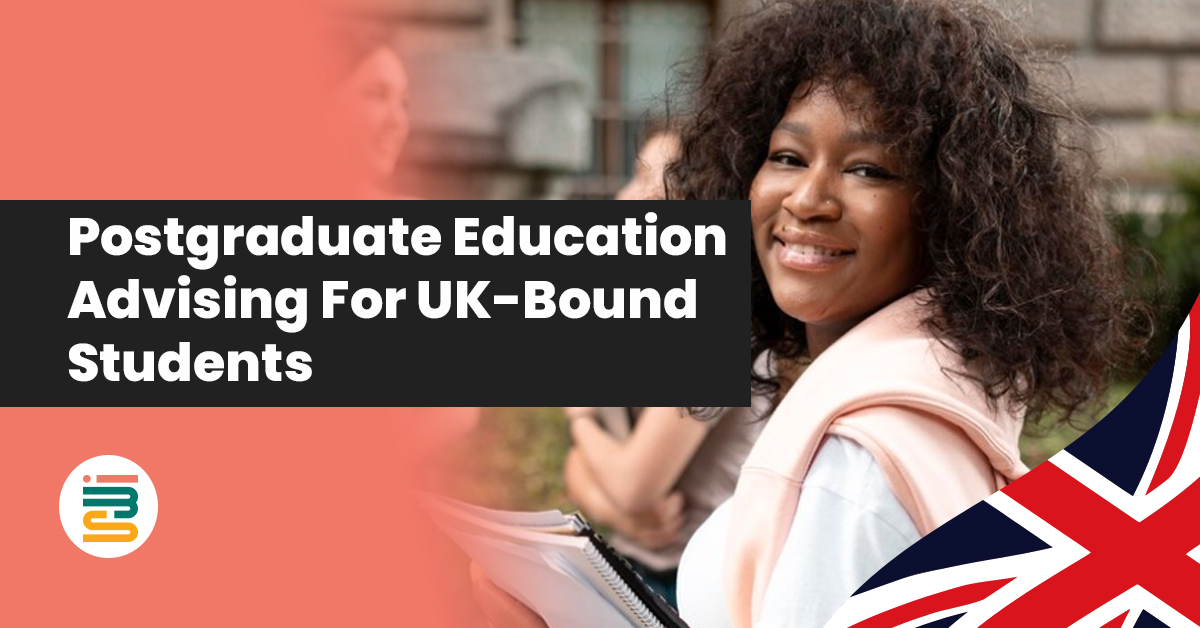Thinking about studying in the UK for your postgraduate degree? It’s an exciting journey filled with opportunities for growth and discovery. But if you’re headed to the UK for higher education, there’s one thing you should never overlook: solid advising. Getting the right advice can make a huge difference, helping you choose the best program, understand the application process, and even find the financial support you need.
This postgraduate education advising article will guide you through the essential steps of preparing for postgraduate study in the UK. From understanding the difference between undergraduate and postgraduate studies to picking a program that fits your career goals, we’ll cover everything a UK-bound student needs to know. Plus, we’ll share practical tips on preparing a strong application, managing finances, and adjusting to life in a new country.
Whether you’re aiming to study at a globally ranked UK university or exploring your options for financial aid, this guide is here to ensure you’re well-prepared. By the end, you’ll have a clear picture of what it takes to succeed in your postgraduate studies and how to overcome common challenges faced by international students. So, let’s dive in and get you ready for this exciting next step in your education!
Understanding Postgraduate education advising for UK-bound students
What is Postgraduate Education?
Graduate education includes any further study after completing a bachelor’s degree, such as master’s and doctoral (Ph.D.) programs. While undergraduate studies lay the foundation, postgraduate programs allow students to dive deeper into specialized fields. You can gain advanced knowledge, build practical skills, and often improve your career opportunities.
Differences Between Undergraduate and Postgraduate Studies
Postgraduate courses are more focused and intensive than undergraduate programs, requiring students to complete in-depth research or projects. Unlike undergraduate classes, where you might cover a broad subject area, postgraduate studies focus narrowly on your field of interest. You’ll also find that postgraduate programs emphasize independent study, critical thinking, and hands-on application of knowledge.
Read More: here’s expert tips on selecting the best consultants abroad
Postgraduate education often equips students with specialized skills that employers highly value, which makes it an excellent step if you aim to enhance your career prospects. The UK offers a wide range of respected postgraduate options, making it a top destination for international students worldwide.
Curious about the advantages of pursuing your studies overseas? Reach out to IBS Consulting and book your FREE consultation to learn more!
Book Your Free Consultation
Why Study in the UK?
Top-Quality Education and Global Recognition
The UK is home to some of the world’s most prestigious universities, such as Oxford, Cambridge, and Imperial College London. UK universities are known for their academic rigor, research contributions, and innovative teaching methods, making degrees from these institutions highly regarded worldwide. Studying in the UK not only gives you quality education but also offers a global reputation that can significantly boost your career.
Diverse Student Community and Rich Cultural Experience
Another reason to consider the UK is the diversity you’ll experience. The country welcomes students from all over the world, making it a vibrant and culturally rich destination. International students can find support, make friends, and adapt easily through various student associations and communities. Studying in the UK also gives you the opportunity to explore Europe, allowing for unique travel and cultural experiences.
Read More: the top 10 cheap study abroad programs
Career Opportunities and Work Experience
The UK government allows international students to work part-time during their studies and offers a post-study work visa for graduates, enabling you to gain valuable work experience. Employers in many countries recognize UK qualifications, so a UK degree can open doors globally, particularly in fields like finance, law, healthcare, engineering, and technology.
Choosing the Right Program
Identify Your Interests and Career Goals
The first step in choosing a postgraduate program is knowing what you’re passionate about and what aligns with your career goals. Ask yourself questions like: What career path do I want to follow? What skills do I need to develop? Does this program offer the specific training or exposure I’m looking for?
Read More: why study in the UK? Here are reasons you might want to consider
Researching Universities and Programs
Once you know your goals, research the universities and their specific programs. Each UK university has its unique strengths. For instance, some excel in scientific research, while others are known for humanities or business. Pay attention to course content, faculty expertise, and research facilities to find the program that best fits your needs.
Read More: top postgraduate degree programs in the UK
Program Duration and Flexibility
Consider the program length and flexibility. Most master’s programs in the UK are one year, while Ph.D. programs typically take three to four years. One-year programs are intensive but allow you to save on costs and quickly enter the job market. Ensure the program structure aligns with your schedule and commitments.
The Application Process for a UK Postgraduate Program
Applying for a postgraduate program in the UK may feel like a big task, but breaking it down into simple steps can make it easier to manage. Here’s a friendly guide to help you through each part of the process, from research to submission.
Step-by-Step Guide to Applying
- Prepare a List of Requirements
Start by making a list of what each university program requires. This could include transcripts, degree certificates, English language test scores, or specific prerequisites. Each program may ask for something different, so take the time to go through each one carefully. Knowing exactly what’s needed will help you stay organized and avoid last-minute stress. - Research and Shortlist Programs
Find programs that match your interests and career goals. Consider the course content, duration, location, fees, and any specific features that appeal to you. You may want to compare programs side-by-side, so you know which one aligns best with your aspirations. - Prepare Your Personal Statement
The personal statement is where you share your motivation, experiences, and dreams. Think of it as your story—it should show your interest in the field, your academic background, and what you hope to accomplish in the UK. Avoid jargon and keep your message clear and genuine. Be direct about why this program matters to you and what you plan to contribute to it. - Gather Letters of Recommendation
Most programs ask for at least one or two recommendation letters. These should come from people who know your academic or work abilities well, like teachers or supervisors. A strong recommendation can highlight your strengths and support your application, so choose recommenders who are familiar with your skills and achievements. Give them plenty of time to write the letter. - Complete and Submit Your Application
Many UK universities use the UCAS application system, while some have their own portals. Make sure you understand each university’s instructions. Upload all the required documents, double-check every detail, and take your time to ensure there are no mistakes. A well-prepared application can help you make a positive impression.
Important Tips for a Smooth Process
- Start Early: Beginning the application process well in advance will give you ample time for each step and help you handle any unexpected challenges.
- Keep a Checklist: Use a checklist to track each requirement. Mark off items as you complete them, so nothing gets overlooked.
- Review and Double-Check: Carefully proofread your personal statement, check that your documents are in the correct format, and make sure every detail in your application is accurate.
- Stay Organized: Keep all your documents in one folder, either digital or physical, and label them clearly. This will save time when you’re uploading files or referencing specific documents.
- Mind the Deadlines: Missing a deadline can hurt your chances of admission, so be aware of each program’s due dates. Set reminders or write down deadlines on a calendar to avoid last-minute rushing.
Funding Options for UK Postgraduate students
Understanding Tuition Fees and Living Costs
UK tuition fees for international students vary depending on the program and university, ranging from £10,000 to £38,000 per year. Beyond funding fees, you’ll need to consider living costs, which can average between £9,000 and £15,000 per year depending on the city. London, for example, tends to be more expensive than smaller cities.
Scholarships and Financial Aid Options
Fortunately, there are various funding options for international students, including scholarships, grants, and bursaries. Some scholarships, like the Chevening Scholarship or Commonwealth Scholarships, are specifically for students from certain countries and cover tuition fees and living expenses. Check the websites of your chosen universities for available scholarships and apply early, as competition is high.
Interested in learning more about the benefits of studying abroad? Call IBS Consulting to schedule a FREE consultation right away!
Book Your Free Consultation
Student Loans and Part-Time Work
International students can also consider student loans, although they might have different terms than loans for UK students. Additionally, the UK allows international students to work up to 20 hours per week during term time and full-time during breaks, which can help cover some living expenses.
Preparing for Life in the UK
Understanding UK Culture and Norms
Adjusting to a new country can be challenging but exciting. In the UK, you’ll encounter diverse cultures, but it’s helpful to understand some British customs and manners. For example, being polite, punctual, and respectful of personal space are all valued in the UK.
Finding Support Networks
Many universities have support services for international students, including orientation programs, counseling, and student societies. Joining these groups can help you make friends, adjust to UK life, and find useful resources. Universities also often have international offices dedicated to helping students from abroad feel at home.
Preparing for the Weather
The UK has a reputation for its changing weather, so bring a good mix of clothing. Winters can be chilly, especially in northern regions, while summers are mild. Having suitable clothing will make you feel more comfortable as you adapt to the UK’s climate.
Common Challenges and How to Overcome Them
Language and Communication Barriers
For students from non-English-speaking countries, language barriers can be one of the initial challenges. Universities often offer English language support to help international students improve their academic English skills, which can make adapting to coursework and everyday interactions easier.
Homesickness and Culture Shock
Homesickness is natural, especially in a new country. Staying connected with family, joining international student groups, and taking part in cultural events can help ease homesickness. Universities usually have resources to help students manage stress and adjust to their new environment.
Navigating Academic Expectations
UK universities may have different academic expectations from what you’re used to, such as independent research and critical analysis. Make use of your university’s academic resources, like tutoring services or study workshops, to get the support you need.
Read More: UK student visa requirements for Nigerian citizens
Conclusion
Deciding to study in the UK is a significant step, and postgraduate education advising can make the journey easier. From choosing the right program and understanding the application process to managing funds and adjusting to life abroad, every stage is more manageable with the right guidance. By seeking out helpful resources, planning early, and preparing for the cultural and academic changes, you’ll be well on your way to a successful and rewarding experience in the UK.
And don’t forget to choose IBS Consulting if you want reliability, and success in this. In addition, Embrace this exciting journey and make the most of your time in the UK, it’s not just about earning a degree but also about growing as an individual. Good luck!





